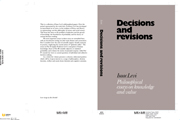Book contents
- Frontmatter
- Contents
- Preface
- PART I Cognitive decision making
- 1 Must the scientist make value judgements?
- 2 On the seriousness of mistakes
- 3 Corroboration and rules of acceptance
- 4 Deductive cogency in inductive inference
- 5 Information and inference
- 6 Epistemic utility and the evaluation of experiments
- 7 Abduction and demands for information
- PART II Knowledge and ignorance
- PART III Chance and surprise
- PART IV Decision making
- Bibliography of Isaac Levi
- Bibliography
- Index of names
- Index of subjects
5 - Information and inference
Published online by Cambridge University Press: 26 March 2010
- Frontmatter
- Contents
- Preface
- PART I Cognitive decision making
- 1 Must the scientist make value judgements?
- 2 On the seriousness of mistakes
- 3 Corroboration and rules of acceptance
- 4 Deductive cogency in inductive inference
- 5 Information and inference
- 6 Epistemic utility and the evaluation of experiments
- 7 Abduction and demands for information
- PART II Knowledge and ignorance
- PART III Chance and surprise
- PART IV Decision making
- Bibliography of Isaac Levi
- Bibliography
- Index of names
- Index of subjects
Summary
Inquiry and information
Inquiries are undertaken in science in order to obtain answers to questions. Embodied in any question are more or less exactly specified assumptions regarding the relevance of any proposed answer to the question and a request that from a list of potential answers one be picked which is at once true and informative in the way required by the question. Consequently, the choice of a conclusion to a given question on given evidence ought ideally to satisfy two desiderata: the answer chosen ought to be true, and the answer ought to supply information of the sort demanded by the question.
Truth, in the sense understood here, is Tarskian truth. Hence, accepting a hypothesis H as true relative to evidence e which does not entail H runs the risk of error even if risks are calculated on the assumption that e is true. Risk of error can, indeed, be avoided by refraining from reaching any conclusions save those implied by the evidence. No rational investigator would follow any other course were the sole desideratum to obtain a true answer to a question. It becomes reasonable on occasion to risk error because answers are not only expected to be true but informative as well. The demand for information renders the risk of error worthwhile.
Thus, the notion of information demanded by a question is of critical importance in a systematic account of standards of legitimate inference.
Information
- Type
- Chapter
- Information
- Decisions and RevisionsPhilosophical Essays on Knowledge and Value, pp. 51 - 69Publisher: Cambridge University PressPrint publication year: 1984
